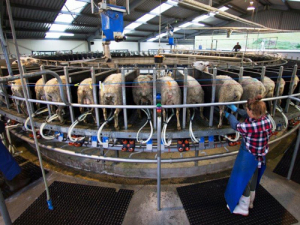Blue River Dairy eyes new markets after China success
Sheep infant nutrition maker Blue River Dairy is hoping to use its success in China as a springboard into other markets in future.
 Farmers interested in milking sheep need to take a “watching brief” on the Government's new Primary Growth Partnership programme.
Farmers interested in milking sheep need to take a “watching brief” on the Government's new Primary Growth Partnership programme.
It's not the time yet for farmers to start getting into dairy sheep, but those interested need to keep a “watching brief” on the Government's new Primary Growth Partnership programme.
So says Spring Sheep Milk chief executive Scottie Chapman.
“In the first instance we have to get the model to work,” he told Rural News.
“New Zealand has been doing this for about 10-15 years and we are still well behind best practice and ability to actually make this work commercially.”
Chapman says the whole purpose of the Primary Growth Partnership programme, in the short term, is to get a model which works, builds interest and gets people involved to come and see it.
“In time, once we’ve got a model that works, we will look at extending it and encouraging other farmers to get involved,” he says. “It is still a few years before they can make it work.”
But Chapman is convinced that long term it is an opportunity for farmers.
“I would suggest to farmers, keep a watching brief, keep an eye on it, follow the numbers, follow what we are doing; it will all be public.”
He believes the most logical places for farms will be near processing, mostly around Waikato.
“Logic says in the short term that is where the opportunities will be. How it plays out in the long term remains to be seen.”
The PGP has several parts to it, he says.
“One is getting the market insight so we are getting consumer demand; the next is research and development to produce those products the consumer wants; the other part is onfarm management and the genetics.”
Chapman believes that NZ has a sensational ability to convert sheep milk into products of value.
“So there is no point in replicating the stainless steel that exists in the dairy industry. It is incredibly well run and looked after so we will continue the current dairy processes; we don’t need to reinvent that wheel.”
Spring Sheep Milk currently uses Waikato Innovation Park’s dryer for the bulk powder then it moves on to processing and canning plants.
“That’s only the powder; we also have gelato and other products. We can use existing NZ players and we will. It is another great advantage for NZ Inc.”
Chapman says they can pick and choose what processing facilities they need, according to what consumers say they want, instead of building a factory and having to process the product.
“It’s global, it’s in the Western world as well. There just happens to be a bigger prevalence in Asia. For them goat or sheep milk are a lot more digestible.
“So the three factors we are selling on are taste, digestibility and nutrition.
“Sheep milk products provide an alternative for those who potentially have a bovine intolerance. Bovine milk is a very good healthy product for most people but if you have an intolerance, there’s an alternative that has the calcium and protein without the digestive issues.”
The South Island Dairy Event has announced Jessica Findlay as the recipient of the BrightSIDE Scholarship Programme, recognising her commitment to furthering her education and future career in the New Zealand dairy industry.
New Zealand and Chile have signed a new arrangement designed to boost agricultural cooperation and drive sector success.
New DairyNZ research will help farmers mitigate the impacts of heat stress on herds in high-risk regions of the country.
Budou are being picked now in Bridge Pā, the most intense and exciting time of the year for the Greencollar team – and the harvest of the finest eating grapes is weeks earlier than expected.
The Real Estate Institute of New Zealand (REINZ) has released its latest rural property report, providing a detailed view of New Zealand’s rural real estate market for the 12 months ending December 2025.
Rural retailer Farmlands has released it's latest round of half-year results, labeling it as evidence that its five-year strategy is delivering on financial performance and better value for members.